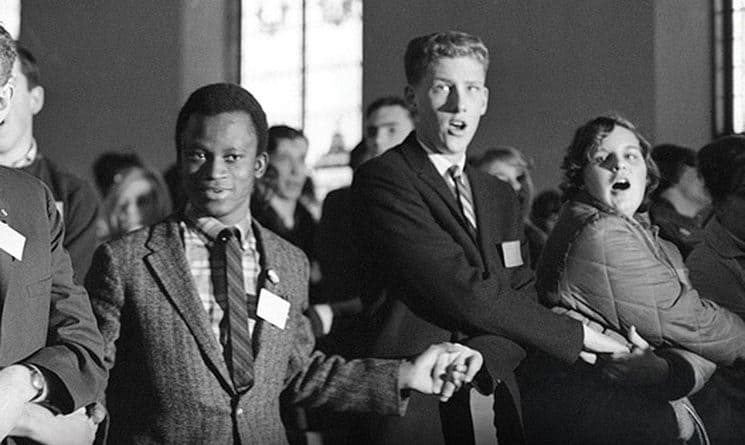Rev. Robert Thompson remembers when the Ku Klux Klan came to Exeter in the 1990s. Thompson, an African-American minister at Phillips Church at Phillips Exeter Academy since 1986, said the white supremacist organization tried to get a foothold in town by recruiting new members, and even had the support of a candidate running for local office.
“This community really responded in what I thought was an admirable way, led by members of the faith communities … to express their dissatisfaction, and formed the Seacoast Coalition against racism,” he said.
It’s an episode that he said was a reminder of the Northeast’s tradition of “principled action in favor of justice and equality” — and an example of the region’s complicated history of race relations.
Thompson and University of New Hampshire history professor Jason Sokol will discuss race relations in the Northeast as part of the “We the People” lecture series at the Exeter Congregational Church on Tuesday, Jan. 13 at 7 p.m.
Race and discrimination are “issues that are chronic in our nation,” Thompson said. “(They) strike at what it means at the core of being an American.”
I think that if people were more open to hearing and listening, then that would be better. Some people don’t even want to hear.
— Rev. Robert Thompson
As part of the talk, Sokol will discuss his latest book, “All Eyes Are Upon Us: Race and Politics from Boston to Brooklyn.”
Sokol, who grew up in Springfield, Mass., and currently lives in Newburyport, said most books that look at the north in terms of race either portray it as “a land of liberty and a place of freedom” or “a place of vicious racism and segregation, roughly comparable to the south.”
“I thought neither perspective was quite right,” Sokol said. There’s a “duality” at the center of northern attitudes about race, according to Sokol. “On the one hand, white northerners try to honor this tradition, as heirs to the abolitionists. On the other hand, many northern cities have patterns of segregation just as entrenched as everywhere else.”
Sokol points to baseball great Jackie Robinson as an example of that dual attitude. While Robinson broke racial barriers on the baseball field in the late 1940s and 1950s, he and his wife had trouble buying a house in white neighborhoods. “Those were the same years that Bedford-Stuyvesant was becoming mostly African-American and becoming more crime-ridden, and patterns of housing segregation and school segregation and episodes of white racism were hardening,” Sokol said.
Sokol also found examples of those complicated attitudes in his own state. In Massachusetts, Edward Brooke became the first African-American elected to the Senate by a popular vote in 1966. That Brooke, a Republican and a Protestant, won — at a time when the state was “97 percent white … heavily Democratic and heavily Catholic,” was a remarkable feat, Sokol said. Brooke, who died on Jan. 3, served two terms in the Senate. He ultimately lost his bid for a third term after he supported bussing as a way to integrate Massachusetts schools. “I argue that had a lot to do with why some white voters turned against him,” Sokol said.
Though much has changed in the following decades, the region still has a lot of work to do when it comes to addressing race and racism. One of the challenges is the region’s lack of diversity, according to Thompson.
“People can still be aware of their own … prejudices and can educate themselves about the privileges of race,” he said. “You don’t always need to personally experience that. I think that if people were more open to hearing and listening, then that would be better. Some people don’t even want to hear.”
Attitudes about race in the Northeast are “still as tangled as they’ve often been,” Sokol said. In some areas, like politics, there are more African Americans and minorities holding and running for office than in previous decades. But African-American people also make up a “disproportionate” number of those in poverty and “represent a disproportionate percentage of those in prison,” Sokol said.
“When you look at those kinds of figures, you have to say we haven’t come that far,” he said.
“Exploring the Northeast’s History of Race Relations” will take place on Tuesday, Jan. 13 at 7 p.m. at the Exeter Congregational Church, 21 Front St., Exeter. For information, call 603-772-4216 or visit exetercongchurch.org.

